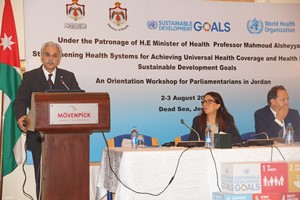 3 August 2017 – The WHO country office in Jordan, in collaboration with the Ministry of Health of Jordan, conducted a 2-day orientation workshop for Parliamentarians in Jordan on 2–3 August 2017, under the patronage of H.E Professor Mahmoud AlSheyyab, Minister of Health of Jordan.
3 August 2017 – The WHO country office in Jordan, in collaboration with the Ministry of Health of Jordan, conducted a 2-day orientation workshop for Parliamentarians in Jordan on 2–3 August 2017, under the patronage of H.E Professor Mahmoud AlSheyyab, Minister of Health of Jordan.
The workshop, entitled "Strengthening health systems for achieving universal health coverage and the health-related Sustainable Development Goals (SDGs)", discussed with members of health committees of the Parliament and the Senate global and national developments concerning universal health coverage and the role of Parliamentarians and other stakeholders in the 2030 Sustainable Development Agenda.
The convening of this workshop was timely in view of the growing global commitment to universal health coverage to achieve the health-related SDGs. Jordan’s health sector is facing substantial challenges in view of the large influx of refugees, the orientation of the health sector towards hospital-based services versus primary health care, the process of the development of a new 5-year strategic health plan and a range of factors that necessitate reaching out to various stakeholders to encourage engagement in constructive partnerships.
The Parliament in Jordan is a bicameral national assembly, i.e. a Senate with 65 nominated members and House of Representatives with 130 elected members. Both houses have committees on health which play a crucial role in terms of law-making and providing an oversight function for policy implementation by the Government.
The workshop was attended by WHO staff from the Regional Office and country offices. Italy’s Deputy Minister of Health Dr Ranieri Guerra attended the workshop. He presented Italy’s experience on health governance and decentralization and shared the lessons learned, opportunities and challenges.
WHO Representative to Jordan Dr Maria Cristina Profili said that Jordan had committed to the 2030 Sustainable Development Agenda and “leaving no one behind”. She added that both the “Jordan 2025” vision, which charts a path for the future and determines the integrated economic and social framework that will govern economic and social policies based on providing opportunities for all, and the Executive Development Programme, which is the first stage in implementing the Jordan 2025 economic blueprint, comprising around 25 development sectors, 121 executive entities, 1826 capital projects and 578 indicators for follow-up and assessment were in line with the Sustainable Development Goals.
Related links
Universal health coverage
Sustainable Development Goals
 3 August 2017 – The WHO country office in Jordan, in collaboration with the Ministry of Health of Jordan, conducted a 2-day orientation workshop for Parliamentarians in Jordan on 2–3 August 2017, under the patronage of H.E Professor Mahmoud AlSheyyab, Minister of Health of Jordan.
3 August 2017 – The WHO country office in Jordan, in collaboration with the Ministry of Health of Jordan, conducted a 2-day orientation workshop for Parliamentarians in Jordan on 2–3 August 2017, under the patronage of H.E Professor Mahmoud AlSheyyab, Minister of Health of Jordan.
The workshop, entitled "Strengthening health systems for achieving universal health coverage and the health-related Sustainable Development Goals (SDGs)", discussed with members of health committees of the Parliament and the Senate global and national developments concerning universal health coverage and the role of Parliamentarians and other stakeholders in the 2030 Sustainable Development Agenda.
The convening of this workshop was timely in view of the growing global commitment to universal health coverage to achieve the health-related SDGs. Jordan’s health sector is facing substantial challenges in view of the large influx of refugees, the orientation of the health sector towards hospital-based services versus primary health care, the process of the development of a new 5-year strategic health plan and a range of factors that necessitate reaching out to various stakeholders to encourage engagement in constructive partnerships.
The Parliament in Jordan is a bicameral national assembly, i.e. a Senate with 65 nominated members and House of Representatives with 130 elected members. Both houses have committees on health which play a crucial role in terms of law-making and providing an oversight function for policy implementation by the Government.
The workshop was attended by WHO staff from the Regional Office and country offices. Italy’s Deputy Minister of Health Dr Ranieri Guerra attended the workshop. He presented Italy’s experience on health governance and decentralization and shared the lessons learned, opportunities and challenges.
WHO Representative to Jordan Dr Maria Cristina Profili said that Jordan had committed to the 2030 Sustainable Development Agenda and “leaving no one behind”. She added that both the “Jordan 2025” vision, which charts a path for the future and determines the integrated economic and social framework that will govern economic and social policies based on providing opportunities for all, and the Executive Development Programme, which is the first stage in implementing the Jordan 2025 economic blueprint, comprising around 25 development sectors, 121 executive entities, 1826 capital projects and 578 indicators for follow-up and assessment were in line with the Sustainable Development Goals.
Related links
Universal health coverage
Sustainable Development Goals
 3 August 2017 – The WHO country office in Jordan, in collaboration with the Ministry of Health of Jordan, conducted a 2-day orientation workshop for Parliamentarians in Jordan on 2–3 August 2017, under the patronage of H.E Professor Mahmoud AlSheyyab, Minister of Health of Jordan.
3 August 2017 – The WHO country office in Jordan, in collaboration with the Ministry of Health of Jordan, conducted a 2-day orientation workshop for Parliamentarians in Jordan on 2–3 August 2017, under the patronage of H.E Professor Mahmoud AlSheyyab, Minister of Health of Jordan. 








